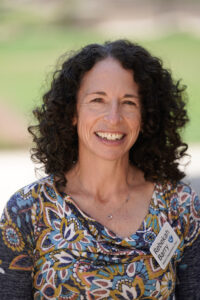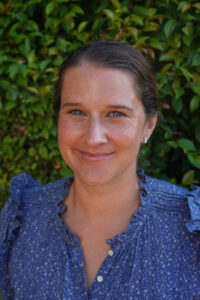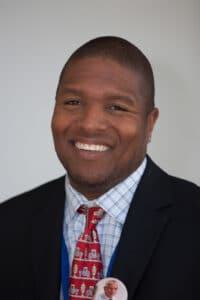Everything has a history.
Home > Departments > History
History Courses
The goals of the History Department are to engage your curiosity in history and give you the skills necessary to research, organize, and interpret historical information.
In your first year, you will take the interdisciplinary course in Humanities which will introduce you to Cate’s culture of inquiry and to explore essential questions of human nature and human experience. Based on key moments in time and place, you will engage with authentic, anchoring artifacts of literature, history, art, architecture, and religion drawn from the classical to early modern eras. The department offers a variety of electives in more specific areas of interest and many courses integrate technology as part of advanced research projects and presentation.
Q&A with History Instructor Juarez Newsome
Q&A with History Instructor Juarez Newsome
Experience an Advanced History Class with Dr. Laura Moore
Experience an Advanced History Class with Dr. Laura Moore
History Electives
In addition to our core offerings in Humanities, World History, and US History, students have the option to choose from a range of Advanced Senior Electives.
This course will focus primarily on the role the Court has played in expanding civil liberties, civil rights, and social justice from the middle of the twentieth century until the most recent rulings. The Supreme Court ruling in Brown v. the Board of Education of Topeka, Kansas (1954) initiated a shift in the Constitutional interpretation of individual rights and privileges as outlined in the Fourteenth Amendment and later expanded notions of privacy. The reach of the Court under Chief Justice Earl Warren (1953-1969) and Warren Burger(1969-1986) moved the judicial branch into areas of influence previously considered the domain of the legislative branch and initiated a revolution in legal thinking in areas of race, family, gender, and privacy as well as issues related to the First Amendment. Beginning in the 1970’s an area of legal thinking to counter the revolution took hold in law schools and became the ideological foundation of a conservative movement that helped Republican presidents remake that Supreme Court beginning with Ronald Reagan. Revolution and Counter-Revolution is the lens through which we will examine the Supreme Court in this trimester elective. The tension between these two forces remains a central political drama and understanding the roots of the conflict will allow us to better participate in the current discussions of the Supreme Court and the debates at the
heart of our political system today.
This trimester elective aims to deepen students’ curiosity about the cultural complexity of the world as well as equip students with the anthropological perspectives and skills to better understand and navigate these complexities in their own lives, both locally and globally. Students will begin by deconstructing key anthropological concepts such as ethnocentrism, cultural relativism, culture, and structural violence. In addition to interpreting ethnographic case studies in light of these concepts, students will be challenged to assess themselves using these cultural terms.
Students also will devote specific attention to exploring anthropological perspectives on race and ethnicity, class and socio-economics, gender and sexuality, politics and religion, language and communication, as well as perspectives on violence and social repair. Finally, throughout the course, students will be introduced to two research methods drawn from the field of anthropology: participant-observation and ethnography. Skills include critical reading skills, scholarly discourse, student-led deliberations, and ethnographic projects, all of which are evaluated at an advanced level.
This course provides an analytical framework for the understanding of the economy from a broad perspective. Students will analyze the function and purpose of the components of Gross Domestic Product, the causes and cost of inflation and unemployment, and the differences between long-term trends and short-term fluctuations within the economy. A strong emphasis will be placed on using an interactive learning approach through active listening, guest speakers, and team building projects and discussions.
Inquiry in History
Meet the Faculty
 History Department Chair
History Department Chair
History Instructor
rebekah_barry@cate.org / 805-684-4127 x228
MA, Brown University
MA, Johns Hopkins University SAIS
BA, Fort Lewis College
Appointed: 2011
Rebekah Barry brings a rich background in national security, international relations, and anthropology to her role as Chair of the History Department at Cate. She has held positions at the Pentagon and National Defense University and conducted ethnographic fieldwork in Turkey. At Cate, she teaches World History, U.S. History, and electives such as “Anthropology of Global Issues” and “Gender Matters,” infusing her curriculum with her expertise in strategic planning and cross-cultural studies.
Rebekah has also served as an Education-Technology Specialist, Chair of the Inclusive Teaching Design Team, and member of the Core DEI Team. Recognized as a Fellow in the Inquiry Collaborative (2017–2020), she was chosen by the Class of 2023 as the Faculty Commencement Speaker.
Rebekah lives on the Mesa with her husband and two sons, enjoying Southern California’s beaches, foothills, and mountains.
 History Instructor
History Instructor
Humanities Department Chair
ivan_barry@cate.org / 805-684-4127 x233
BA, Georgetown University
MA, Johns Hopkins SAIS
MA, Bosphorus University
Appointed: 2010
Ivan brings a wealth of global experience to Cate as Chair of the Humanities Department. A Fulbright Scholar, Ivan spent years in government, global finance, and international consulting, living in Turkey for eight years and traveling extensively in the Middle East. At Cate, he teaches Micro and Macro Economics, as well as Modern Middle East, integrating his professional expertise and global perspective into the classroom.
Recognized for his innovative teaching, Ivan is a recipient of Cate’s Centennial Award. He also leads outings to Kern as a former wilderness backcountry instructor.
Ivan attended Phillips Academy, Andover, and deeply values the boarding school experience. He lives on the Mesa with his wife, Rebekah, also a Cate faculty member, and their sons, Kiyan and Aydin.
 History Instructor
History Instructor
PhD, Brandeis University
MA, Brandeis University
Hons, Australian National University
BA, University of Melbourne
Appointed: 2023
Dr. Clair Dahm brings extensive expertise in U.S. history and skills-based education to Cate. With a PhD from Brandeis University, her scholarship focuses on 20th-century social and criminal justice history. While completing her doctorate, Clair taught seminars in U.S. Legal and Political History and won a teaching award for her work.
Before joining Cate, Clair taught at Phillips Academy, where she led a 14-person U.S. History course team, served as Assistant Chair and Chair of the History Department, and contributed to DEIJ curricular reviews and programming.
Originally from Melbourne, Australia, Clair has spent over a decade teaching in New England. She is thrilled to call the Mesa home and lives in ’25 House with her husband, Zack, and their dogs, Harvey and Midge.
 Assistant Head of School
Assistant Head of School
History Instructor
jay_dorion@cate.org / 805-684-8409 x207
BA, Colby College
MALS, Wesleyan University
Appointed: 2002
In 2002, Jay joined the Cate community as a history and English teacher, coach, dorm parent, and advisor. Over the years, his roles evolved to include serving as Dean of Students (2004-2008), Assistant Head (2009-2022), and most recently, Assistant Head for Students (2022-2024). Jay began his career in education in 1993 at Cheshire Academy, where he taught history and English, coached, dorm-parented, and advised students.
During his time at Cate, Jay has taught World History to sophomores and coached boys and girls basketball. His contributions to the School have been recognized with accolades like the 2006 Yearbook Dedication and the Spittler Cup, awarded in 2008 and 2022.
Jay and his wife, Margot, raised their three children – Molly ’18, Olivia ’22, and Charlie ’26 – on the Mesa. They share their home with Stella the cat. In his free time, Jay enjoys hiking, running, playing pickup basketball, attending live music events, and reading for pleasure.
 History Instructor
History Instructor
lisa_holmes@cate.org / 805-684-8409 x202
BA, Colby College
MLS, Wesleyan University
MEd, Columbia University
Appointed: 2001
Lisa Holmes brings over three decades of experience in education to Cate, where she has taught in both the English and History departments. A former varsity soccer captain at Colby College, Lisa holds advanced degrees from Wesleyan and Columbia, with a focus on American Studies that informs her interdisciplinary teaching style.
Before joining Cate in 2001, Lisa taught, coached, and dorm-parented at Cheshire Academy for 10 years and spent a year at the Calhoun School in New York. At Cate, she has served as History Department Chair, Director of Studies, and Dean for Faculty. She is the recipient of the Edmund Littlefield Distinguished Teaching Chair for excellence in the humanities.
Lisa enjoys hiking, running, and traveling. She lives on the Mesa with her husband, Will, their goldendoodle, Pudge, and is a proud mom to two Cate graduates, Scott ’20 and Matthew ’22.
 History Instructor
History Instructor
laura_moore@cate.org / 805-684-8409 x212
PhD, University of California, Santa Barbara
MA, University of California, Santa Barbara
BA, University of California, San Diego
Appointed: 2017
Dr. Laura Moore’s passion for history stems from her upbringing in Oakland, surrounded by a community of storytellers and historians, and her time studying Irish history in Dublin. She began her teaching career at UCSB, teaching in Black Studies, Writing, and History programs while completing her doctorate in American history.
At Cate, Laura teaches U.S. History, Women and Gender History, and Advanced History Electives, with expertise in race, ethnicity, and immigration. She has received multiple accolades, including the Spittler ’63 Cup and the W. Burleigh Pattee Award in 2020.
A former collegiate basketball player at UC San Diego, Laura continues to stay active as a basketball coach, earning Frontier League Coach of the Year in 2020 and 2023. She lives in ’25 House with her husband Casey, sons Leigh and Benny, and their golden retriever, Charlie Bear.
 History Instructor
History Instructor
juarez_newsome@cate.org / 805-684-8409 x133
BS, Washington and Lee University
Appointed: 1997
Juarez Newsome teaches history in Cate’s Upper School, bringing decades of experience and a passion for education to the classroom. He also serves as director of student activities, MOD for the residential program, offensive coordinator for the football team, and co-director of the Model UN Program. In recognition of his excellence in teaching, he was awarded the Colin Day Chair in 2014 and is also a recipient of the Spittler Cup and Burleigh Pattee Fellowship.
A former college lacrosse referee, Juarez officiated the MCLA finals in 2013 and 2017. Outside of work, he enjoys spending time with his dog, Sable, and staying connected to the sport he loves.
 History & Humanities Instructor
History & Humanities Instructor
Hannah_Solis-Cohen@cate.org / 805-684-4127 x127
BA, University of Virginia
MEd, University of Pennsylvania
Appointed: 2020
Hannah Solis-Cohen brings a passion for inclusive teaching and curriculum development to Cate. A graduate of the University of Virginia, she studied history while competing as a scholarship athlete on the Varsity Rowing Team, earning an NCAA championship in 2015 and the Craig Fielder Memorial Award for Leadership in 2016.
Before joining Cate, Hannah worked as an Admissions Associate at Blair Academy and as a University of Pennsylvania Teaching Fellow at Hopkins School in Connecticut. At Cate, she is dedicated to fostering DEI initiatives and supporting neurodiverse students. In 2023, her excellence was recognized with the Patee Award.
Hannah lives off campus with her husband, Andrew MacDonnell, and their dog, Sadie.